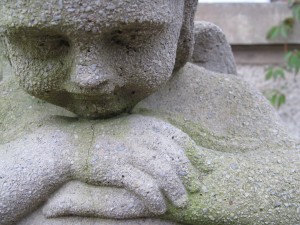“…will we dare to grow up… into the one who extends the unconditional love and deep compassion of Jesus to ourselves?”
I have recently been re-reading The Return of the Prodigal by Henri Nouwen, a thoughtful book reflecting on the story of the prodigal son through the lens of Rembrandt’s painting of the same. Nouwen places himself inside each of the characters in that story and offers some wonderful reflections on the love of God.
The part of the book that has caught my attention this week revolves around Nouwen’s reflections on becoming the father:
But what of the father? Why pay so much attention to the sons when it is the father who is in the center and when it is the father with whom I am to identify? Why talk so much about being like the Sons when the real question is: Are you interested in being like the father? It feels somehow good to be able to say: “These sons are like me.” It gives a sense of being understood. But how does it feel to say: “The father is like me”? Do I want to be like the father? Do I want to be not just the one who is being forgiven, but also the one who forgives; not just the one who is being welcomed home, but also the one who welcomes home; not just the one who receives compassion, but the one who offers it as well?
Isn’t there a subtle pressure in both the Church and society to remain a dependent child? Hasn’t the Church in the past stressed obedience in a fashion that made it hard to claim spiritual father hood, and hasn’t our consumer society encouraged us to indulge in childish self—gratification? Who has truly challenged us to liberate ourselves from immature dependencies and to accept the burden of responsible adults? And aren’t we ourselves constantly trying to escape the fearful task of fatherhood?
In my own life, I often notice how much I struggle to grow up.
I also notice how often I consider myself to be the singular exception to my calling to love unconditionally.
Jesus taught us how to have compassion on ourselves by extending compassion toward us and by pointing our attention back toward ourselves rather than always toward others:
- In the midst of Martha’s distraction, Jesus helped her see herself and offered her a picture of an alternative way of living: “Martha, Martha you are worried and upset about many things”
- In the midst of the woman at the well’s fearful hiding with half-truths, Jesus gently brought the full story to the surface so that generously compassionate, courageously authentic connection could be established: “I, the one speaking to you—I am he (the Messiah).”
- In the midst of the woman with the completely healed hemorrhage’s chosen invisibility, Jesus stubbornly and silently held time and space for her to find enough faith to come and tell her story: “Daughter, your faith has healed you. Go in peace.
- In the midst of the woman bent over’s hope-less absence of a request for healing, Jesus felt compassion and touched her, unwilling that she should suffer one more day, even healing her on the Sabbath: “Woman, you are set free from your infirmity.”
- In the midst of cultural and religious systems that cut her off from access to the healing of her child, Jesus first seemed to uphold and then broke those rules crediting the Canaanite woman with her daughter’s healing: “Woman, you have great faith! Your request is granted.”
So, today, this moment, will we dare to grow up, as Nouwen says, into the one who extends the unconditional love and deep compassion of Jesus to ourselves?
- When we are worried and bothered… will we look in a mirror and envision other possibilities
- When we are ashamed of the truth or afraid of rejection… will we gently tell the whole truth and connect with others
- When we are hiding in the safety of the shadows… will we hold patient silence and space for ourselves until we are ready to move forward
- When we are bent over… will we let our hearts be moved to self-compassion, offering ourselves freedom and tender touch even if the timing is not convenient
- When we are excluded… will we remind ourselves that we cannot not belong in the love of God
What will unconditional love in the form of self-compassion look like for you today?











